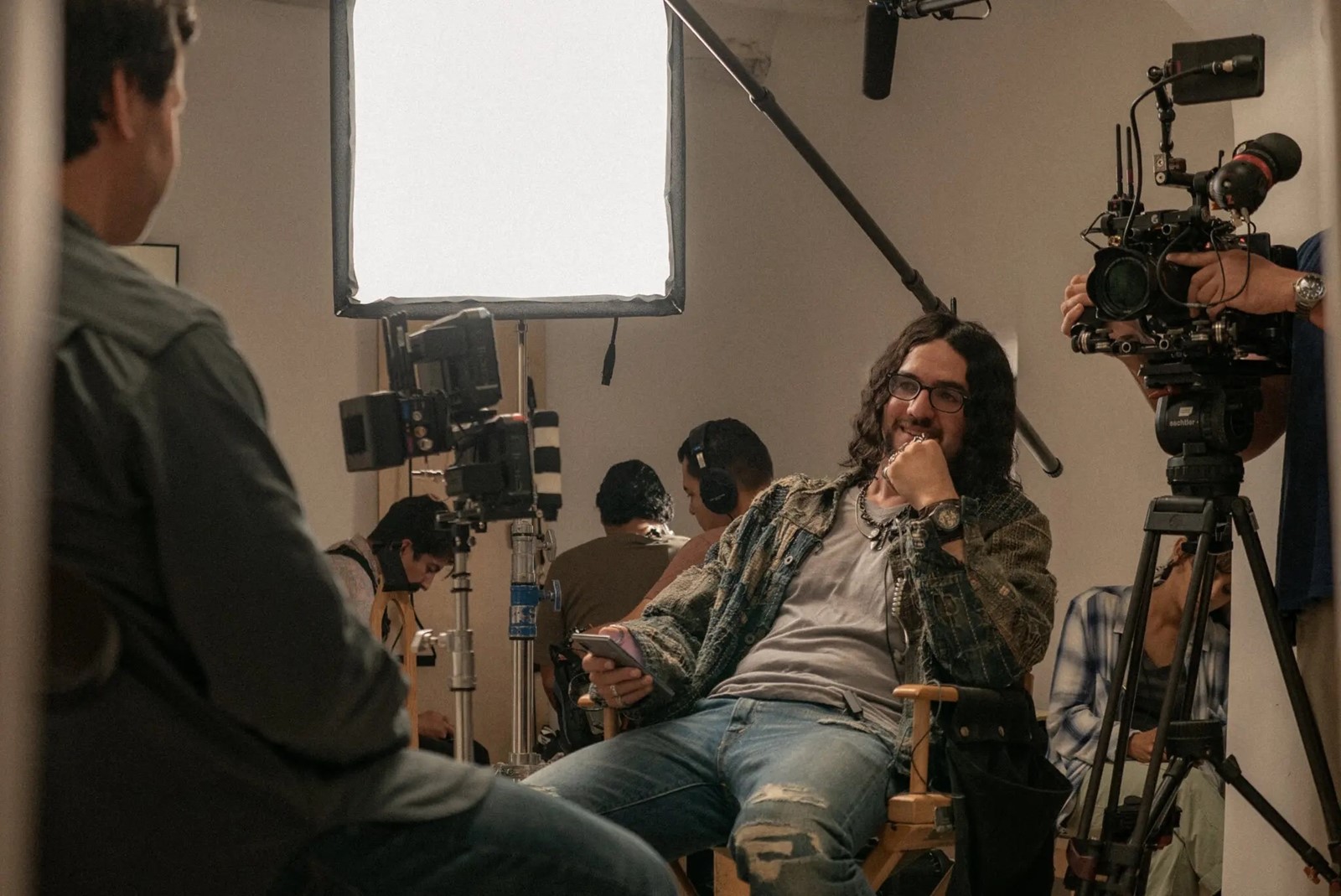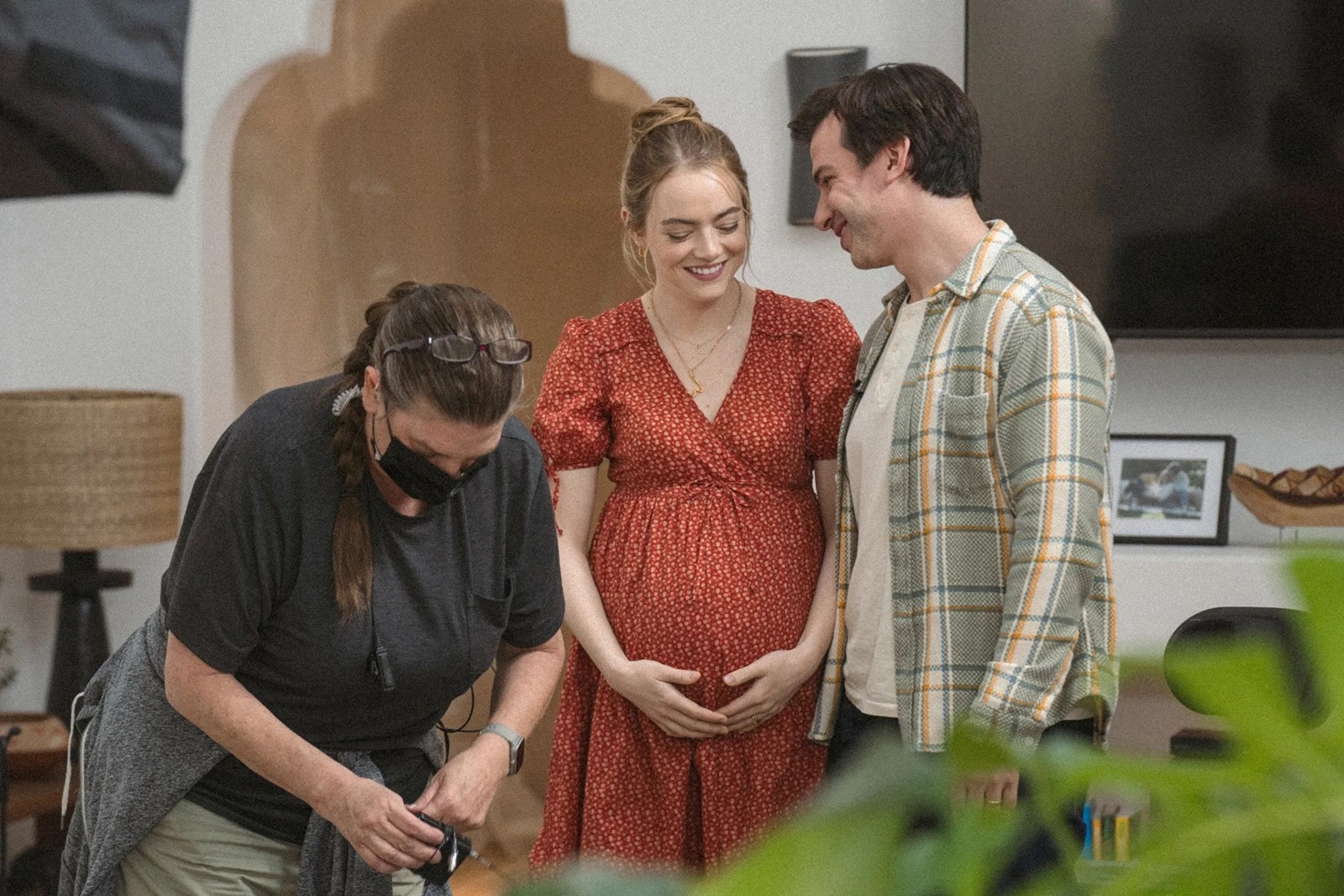What makes a good marriage? That rather depends on what one means by “good”. Goodness, as a concept and as a philosophy, is a shared obsession for husband-and-wife team Asher and Whitney Siegel, the eco-developers and aspiring reality stars at the centre of Benny Safdie and Nathan Fielder’s cringe-satire The Curse, and this ethical folie à deux is also the focus of the power struggle at the centre of their unbalanced relationship. Whitney (Emma Stone), the extremely wealthy daughter of two slum-lords, is a Bambi-eyed, beautiful cipher of a woman, her Free People clothing and ostensible obsession with social justice scarcely covering her narcissistic aptitude for social climbing; the buffoonish Asher (Nathan Fielder) is a strange charisma vacuum, his mannerisms occasionally suggesting an alien camouflaged in human skin. We meet the Siegels as they’re working on a pilot for a show on HGTV, the American home renovation network, with the stupid name “Fliplanthropy”. That “Flipanthropy” is infinitely easier to say, and that many recappers have spent full ten weeks mistakenly calling it this instead because why the fuck is it not Flipanthropy?, is a perfect summary of The Curse’s eccentric approach to narrative and tone – it consistently takes unremarkable ideas and images and twists them, slightly but unnervingly, until they feel awkward or perverse.

As a location for the series, the Siegels have selected Española, a neighbourhood in New Mexico with a large Indigenous American population, and Fliplanthropy’s concept sees them helpfully improving (ie gentrifying) the area with “passive homes,” which are expensive houses designed from the ground up to be ecologically efficient. Eerily, Whitney’s architectural hallmark is the use of mirrors as an exterior flourish, giving her designs a phantasmagoric look; she intends for their reflectiveness to prove how seamlessly her work fits into the existing natural landscape, but they actually evoke Whitney herself, all distorting shine and surface. On camera, Whitney and Asher hope to suggest a fully unified and wholesome front, based on their passion for ineffectual Caucasian do-gooding. Off camera, their vibe is more Ingmar Bergman joint than Ben and Erin Napier, and when their producer Dougie (Benny Safdie) notices the tension, he decides to capitalise on it by encouraging Whitney to badmouth her husband in her taped confessionals. Whitney, warming to the idea, suggests renaming the show Green Queen, making herself the regal focus, and Asher her idiot court jester.
The curse referred to in the title happens in the series’ pilot, when Asher gives a child selling sodas in a supermarket parking lot a hundred-dollar bill and then, when the cameras have stopped rolling, asks if he can have it back. “I curse you,” the little girl says, coolly. Asher, and by extension, the viewer, is left in doubt as to the mystical veracity of this interaction. Does this girl, Nala, have supernatural powers? Is Asher doomed? Ultimately, as Whitney and Dougie slip further into cahoots and Whitney’s naked dislike of her husband makes itself more and more plain, it becomes clear that Nala’s curse is a feint, and what had previously seemed to be a show about gentrification – in the case of both Fliplanthropy and The Curse itself – begins to transmogrify into one that is mostly about a fascinatingly terrible relationship instead. The most compelling mystery, at least for the first eight episodes, is how these two people ever came together in the first place.

Finally, as The Curse nears its end, the dynamic of the Siegels’ marriage begins shifting into clearer focus, and two things especially seem to make them strangely perfect for each other: Asher’s secret cuckold fetish, and Whitney’s rabid desperation to be seen as selfless. In the penultimate episode, Whitney makes her husband watch a cut of Green Queen she and Dougie have produced where she talks about the possibility of getting a divorce, citing Asher’s clingy and obsequious behaviour, and rather than being angry, Asher reaffirms his love in a voice that makes him sound like a mall shooter uploading a video manifesto to his blog. “If you didn’t want to be with me, and I actually truly felt that, I’d be gone,” he says, panting, his eyes glinting with mania. “You wouldn’t have to say it. I would feel it, and I would disappear.” Whitney, trying to maintain the inscrutable, cool expression she adopts reflexively whenever she is having an actual feeling, trembles with what looks a lot like fear.
This is, I think, the moment that The Curse cracks open. When I said that Whitney’s mirrored houses were suggestive of her own reflective surface, I was thinking not only about the way she interacts with the world at large, but the way she interacts with her doofus of a husband. In a marriage, it is not uncommon to be mirrors for each other – to experience attraction because each of you is able to present the person opposite them with a vision of themselves that they have always longed to see. Asher, with his fetish for imagining his wife with other, more masculine men, eroticises the idea of himself as an unworthy piece of shit, and Whitney certainly has no compunctions about treating him like dirt; Whitney, longing to be different from her parents, must at one time have been thoroughly entranced by Asher’s willingness to think of her as saintly, free of capitalist sin. That crack, then, is a crack in the infinity mirror of their coupling, and it lets them see each other, and themselves, for what they really are. Thus, Whitney realises that she has made a slave out of a madman and an idiot, and that keeping him around will only make her more aware of her own capacity for sadism. Asher sees that Whitney does not share his fetish, and that rather than appreciating his strange, slavering adoration as an act of masochism and sacrifice, she looks at him and sees a creep.

All of which leads up to a bold finale that flips suddenly from cringe comedy into something closer to the work of David Lynch, a brilliant bit of surrealism that is at once conceptually clarifying and logically opaque. Whitney, in flash-forward, is extremely pregnant, and the couple are promoting the first season of Fliplanthropy while waiting for the birth. One morning, they wake up to find that Asher has ascended to the ceiling of their bedroom in the night, and that like a man-shaped helium balloon, he is stuck there. As in Buñuel’s 1962 film The Exterminating Angel, in which a group of rich people find themselves trapped inexplicably at a dinner party, the problem they are facing is insoluble by money; as in The Exterminating Angel, too, they react at first as though what’s happening must be normal or deniable. Whitney, after an attempt to yank him down, goes into labour, and when she drags Asher from the house to drive her to the hospital, he flies into a tree, where he remains until the fire brigade cut him loose and he is sucked into the stratosphere. By the time we see Asher floating out in space, intercut with a shot of Whitney cradling their baby, it is obvious that Sadfie and Fielder are making another movie reference, and a witty one at that. For a show where, often, very little happened in an episode, The Curse certainly makes up for lost time by rising to cosmic new heights in its final hour.
Why does Asher, as if he is being raptured, float into the sky? There is no certain explanation. In a sense, Whitney has been the colonising, gentrifying force in her own marriage, and now that she is pregnant, Asher has been thoroughly subsumed, and there is little left for him to do but “be gone” and “disappear.” Nobody can offer more unconditional love, or a more unconditional image of you as a perfect idol, than your baby, and a cynic might suggest that this is why the moment Whitney meets her son is the first time we see real pleasure on her face. This idea is also shored up by the fact that Dougie, on seeing Asher lodged up in that tree, mistakes his metaphysical predicament for a reaction to a very common fear: that of a woman’s love being redirected to her child, leaving her man feeling vestigial and unwanted. “Sometimes you have to go to extreme lengths to make your point,” Asher tells Whitney the night before he ends up on the ceiling of their bedroom, and it feels as though his mischievous creators are alluding to their use of such a wild narrative swing to end a story that has turned out to be about two of the most quotidian things on earth: new parenthood, and a bad marriage. All romantic unions, whether they are “good” or not, are mutual delusions – the real curse is the knowledge that the spell that binds you both to this shared reality can break at any moment, leaving at least one of you up in the air.
The Curse is available to stream on Prime Video now.
